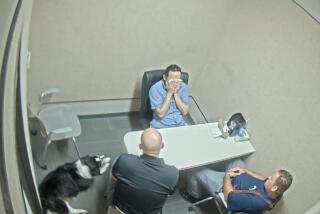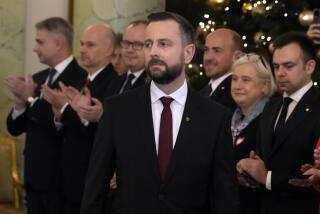Cabinet Deputy Linked to Polish Priest’s Death
- Share via
TORUN, Poland — A deputy minister of interior was named in trial testimony Monday as having approved the covert operation last October in which a pro-Solidarity priest was kidnaped and murdered.
The official, identified as Wladyslaw Ciaston, was linked publicly to the case for the first time in the trial of four secret police officers charged with the abduction and killing of Father Jerzy Popieluszko, the 37-year-old priest whose death brought Poland to the edge of new civil strife.
The Polish government and the Communist Party have condemned the killing as a “political provocation” against the leadership of Premier Wojciech Jaruzelski and have vowed to expose the instigators. Many Poles, however, doubt that the government will follow the trail of responsibility high into its own ranks, at least in public.
Officer’s Testimony
The name of the deputy minister, the highest ranking official to be publicly linked to the murder so far, appeared in pretrial testimony by one of the four officers, Lt. Waldemar Chmielewski, 29, who finished testifying Monday after four days on the witness stand.
Chmielewski, who suffers from a severe speech impairment said to have begun several days after his arrest as a result of nervous stress, listened as his earlier testimony was read in court. He then partially recanted, saying that he had only assumed it was Ciaston who had approved the operation.
Duties Unknown
The precise duties of Ciaston, who is one of at least five deputy ministers of interior, could not be learned immediately. The Interior Ministry includes both the uniformed police and the Security Service, Poland’s security and intelligence agency.
The young lieutenant also disclosed that the three-man kidnap team was in radio contact with Warsaw headquarters of the Security Service the night they seized Popieluszko near Torun, 125 miles northwest of Warsaw; bound and gagged him, beat him, then threw his weighted body in a Vistula River reservoir.
Answering questions from his defense attorney, Chmielewski said in a trembling stammer that on the night of Oct. 19-20, the accused leader of the kidnap team, Capt. Grzegorz Piotrowski, used a radio in their police car to call their headquarters in Warsaw.
He said Piotrowski used a code name to summon the duty officer in Warsaw, but the voice that answered on the radio was not that of the officer.
Asked who answered the call, Chmielewski said he heard the voice of Gen. Zenon Platek. Platek is head of the 4th Department of the Security Service, the branch targeted against Poland’s Roman Catholic Church.
The disclosure suggested that the kidnapers maintained routine communications with Warsaw, rather than working, as the state prosecutor has charged, in secrecy without the knowledge of the department head.
General to Testify
The indictment describes Platek as having had no inkling at the time that his officers were involved in Popieluszko’s disappearance. The general, who was suspended from duty in November for failing to exercise supervision over his subordinates, is to appear later in the trial as one of 22 witnesses.
Chmielewski, Piotrowski and Lt. Leszek Pekala, 32, are charged with carrying out the kidnaping and killing. Their superior and Platek’s deputy, Col. Adam Pietruszka, 47, is charged with aiding and abetting the crime and attempting to cover up the involvement of the three officers. All four could face the death sentence if convicted.
One of the trial’s more dramatic moments came as portions of Chmielewski’s pretrial testimony to investigators was read out in the packed courtroom, which holds about 100 people.
The officer, who appeared strained and exhausted and required hourly rest breaks, was said by investigators to have described Capt. Piotrowski as “exultant” after learning early in October that Col. Pietruszka had obtained the approval of high-level officials for the operation against Popieluszko.
“Piotrowski said Pietruszka had to clear the whole operation with Ciaston,” the lieutenant was quoted as saying.
Asked in court to confirm his statement, he said he now believed only that the word “superior” was used, and that he only assumed this to be a reference to Deputy Minister Ciaston.
Polish observers, however, said that even the mention of a government official in a trial that is likely to be proceeding within predetermined bounds of disclosure could spell the end of the official’s career.
As Chmielewski testified, Capt. Piotrowski made what observers in the courtroom said was an exaggerated display of disdain, examining his fingernails, brushing specks of dirt from his dark suit, puffing out his cheeks in a mock whistle.
As the lieutenant finished his testimony and Piotrowski moved into the dock to begin his, the two men passed each other in what was probably their first contact since they were arrested at the end of October. Piotrowski glared contemptuously at his former subordinate and whispered to him.
In his few minutes on the witness stand before the trial adjourned for the day, he spoke in a strong, calm voice.
Logical Inconsistencies
He acknowledged taking part in the kidnaping and beating of Popieluszko and helping throw the body in the reservoir, but he avoided any admission of guilt for the priest’s death. He suggested instead that it was accidental.
“I admit committing the crimes and (confess) guilt,” he said, “but the charges--no.” There were logical inconsistencies in the indictment, he explained in a patient voice. “Therefore I consider the whole to be invalid.”
The trial, one of the most unusual ever held in a Soviet Bloc country, is being carried out under heavy security in a courtroom guarded by anti-terrorist commandos dressed in combat uniform and armed with revolvers and daggers.
Polish authorities have issued passes to seven Western news organizations, but others, including The Times, have been barred.
More to Read
Sign up for Essential California
The most important California stories and recommendations in your inbox every morning.
You may occasionally receive promotional content from the Los Angeles Times.










